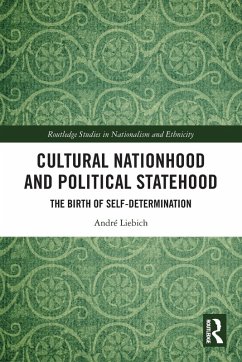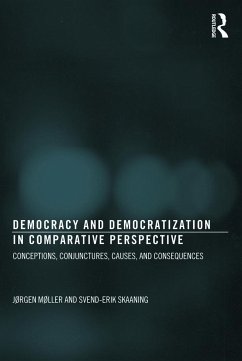
Political Ideologies and the Democratic Ideal
Versandkostenfrei!
Versandfertig in 1-2 Wochen
96,99 €
inkl. MwSt.
Weitere Ausgaben:

PAYBACK Punkte
48 °P sammeln!
Now in its twelfth edition, Political Ideologies and the Democratic Ideal continues the book's tradition of offering a clear, concise, and comprehensive introduction to the ideas and ideals that shake and shape our political world. The text outlines a framework defining each ideology in terms of the four functions ideologies performs - explanation, evaluation, orientation, and political program - allowing students to compare, contrast, and analyze the various ideologies, developing their own unique views and critical thinking skills.New to this EditionA new co-author, Jennet Kirkpatrick, recog...
Now in its twelfth edition, Political Ideologies and the Democratic Ideal continues the book's tradition of offering a clear, concise, and comprehensive introduction to the ideas and ideals that shake and shape our political world. The text outlines a framework defining each ideology in terms of the four functions ideologies performs - explanation, evaluation, orientation, and political program - allowing students to compare, contrast, and analyze the various ideologies, developing their own unique views and critical thinking skills.
New to this Edition
A new co-author, Jennet Kirkpatrick, recognized for her teaching and scholarship in political theory, feminist theory, and resistance.Chapter 2; updated material on voter suppression and populism.Chapter 3; expanded discussion of the relationship between Adam Smith's moral and economic theories; how John Stuart Mill's views on free speech might apply to contemporary controversies; differences between John Rawls and Robert Nozick, and between neoclassical and welfare liberals more generally. Updated; discussion of the "Great Recession" and broader issues of economic inequality.Chapter 4; extended discussion of Edmund Burke's place within the conservative tradition. Updated; assessment of contemporary conservatism in light of Donald Trump's presidency; new section on Christian Nationalism.Chapter 5; extended discussion of Marx's theory of history.Chapter 6; updated the status of the socialist and communist traditions in China, Russia, and the United States.Chapter 7; charted the resurgence of far right and neo-fascist politics in Europe. Discussion of the "Alt-Right" in the United States has been expanded, including new sections on QAnon and the "Great Replacement" theory. Also expanded upon; discussion of whether fascism could gain serious traction in the United States, and a new section on the reasons why some critics say Donald Trump is either a fascist, or dangerously close to becomingone.Chapter 8; updated sections on Black liberation and feminism, including reference to George Floyd's murder and the Dobbs decision that overturned Roe v. Wade. Also, new material on settler colonialism and on the issues for all liberation ideologies raised by the case of undocumented immigrants, and extended discussion of liberation theology.Chapter 9; updated material on the severity of the climate crisis, and the variety of responses that have emerged to address it.Chapter 10; a new section on Hamas, and extended discussion of protests against Islamist rule in Iran focusing on the responses to Mahsa Amini's death in police custody. Also updated; sections on ISIS and the Taliban in light of the former's erosion and the latter's return to power, in addition to references to internecine conflicts among radical Islamists.Chapter 11; updated reasons for the conclusion that there will be no end of ideological conflicts soon, especially with the continued power of religious worldviews, globalization, and---perhaps most especially---the return of fascism worldwide.
New to this Edition
A new co-author, Jennet Kirkpatrick, recognized for her teaching and scholarship in political theory, feminist theory, and resistance.Chapter 2; updated material on voter suppression and populism.Chapter 3; expanded discussion of the relationship between Adam Smith's moral and economic theories; how John Stuart Mill's views on free speech might apply to contemporary controversies; differences between John Rawls and Robert Nozick, and between neoclassical and welfare liberals more generally. Updated; discussion of the "Great Recession" and broader issues of economic inequality.Chapter 4; extended discussion of Edmund Burke's place within the conservative tradition. Updated; assessment of contemporary conservatism in light of Donald Trump's presidency; new section on Christian Nationalism.Chapter 5; extended discussion of Marx's theory of history.Chapter 6; updated the status of the socialist and communist traditions in China, Russia, and the United States.Chapter 7; charted the resurgence of far right and neo-fascist politics in Europe. Discussion of the "Alt-Right" in the United States has been expanded, including new sections on QAnon and the "Great Replacement" theory. Also expanded upon; discussion of whether fascism could gain serious traction in the United States, and a new section on the reasons why some critics say Donald Trump is either a fascist, or dangerously close to becomingone.Chapter 8; updated sections on Black liberation and feminism, including reference to George Floyd's murder and the Dobbs decision that overturned Roe v. Wade. Also, new material on settler colonialism and on the issues for all liberation ideologies raised by the case of undocumented immigrants, and extended discussion of liberation theology.Chapter 9; updated material on the severity of the climate crisis, and the variety of responses that have emerged to address it.Chapter 10; a new section on Hamas, and extended discussion of protests against Islamist rule in Iran focusing on the responses to Mahsa Amini's death in police custody. Also updated; sections on ISIS and the Taliban in light of the former's erosion and the latter's return to power, in addition to references to internecine conflicts among radical Islamists.Chapter 11; updated reasons for the conclusion that there will be no end of ideological conflicts soon, especially with the continued power of religious worldviews, globalization, and---perhaps most especially---the return of fascism worldwide.













